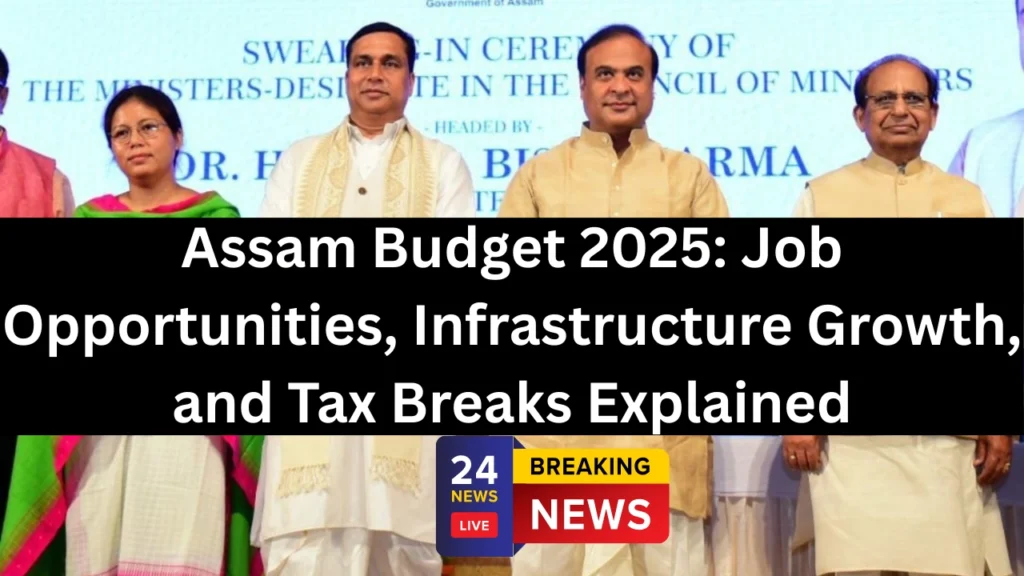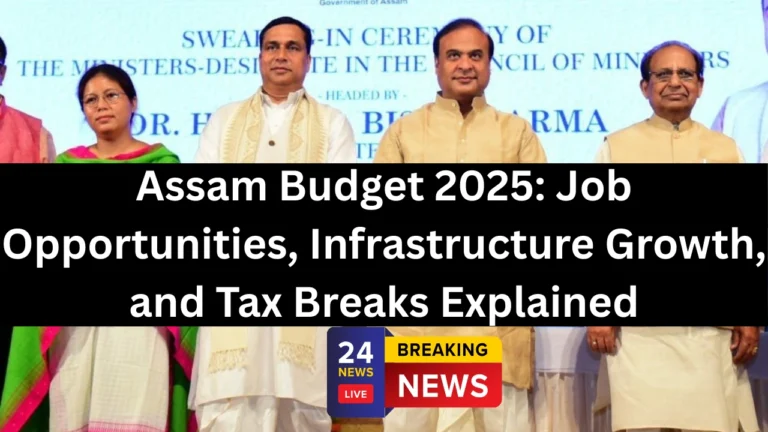The Assam Budget for 2025 has ignited widespread conversation, revealing ambitious strategies for job creation, infrastructure development, and tax relief. Unveiled by Finance Minister Ajanta Neog, the budget aims to bolster the state’s economy while providing enhanced prospects for its residents. But how does this affect you, whether you’re a student, a business owner, or a taxpayer? Let’s simplify the key points.

Assam Budget 2025: At a Glance
| Aspect | Details |
|---|---|
| Total Budget | ₹1.39 lakh crore |
| Key Focus Areas | Job creation, Infrastructure, Tax Relief |
| Job Initiative | ₹2,500 monthly assistance for graduates, ₹25,000 research grants |
| Infrastructure | New industrial parks, township projects |
| Tax Relief | Professional tax exemption for income up to ₹15,000/month |
| Subsidies | ₹1/unit electricity rebate, food subsidies for 60 lakh families |
| Official Source | Assam Government Website |
The 2025 Assam Budget prioritizes economic expansion, youth employment, infrastructure upgrades, and lightening the tax load on citizens without introducing new taxes. By concentrating on job growth, industrial development, and essential subsidies, the government seeks to forge a more robust, self-reliant Assam. For official information, visit the Assam Finance Department.
Decoding the Budget: Key Initiatives
1. Empowering Youth with Job Opportunities
Assam’s young population is set to gain significantly from the Chief Minister’s Jibon Prerana initiative. This plan offers:
- ₹2,500 monthly support to 2025 graduates from government universities and colleges for up to one year, aiding their job search and competitive exam preparation.
- A one-time financial grant of ₹25,000 as an alternative.
- Research grants of ₹25,000 for scholars and ₹50,000 for differently-abled researchers, ensuring financial stability for academic pursuits.
What This Means for You
If you’re a student or a recent graduate, this financial aid can help cover living costs while you focus on career advancement.
2. Infrastructure Overhaul: Better Roads and Industrial Hubs
The budget allocates substantial funds for:
- Developing industrial parks in Dibrugarh, Golaghat, Silchar, Jagiroad, Palashbari, Tezpur, and Nalbari, with an initial ₹500 crore investment.
- Establishing new township projects in Jagiroad and Palashbari, backed by ₹8,000 crore funding from the Asian Development Bank (ADB).
- Promoting clean energy initiatives through Energy Hub Development in Karbi Anglong, West Karbi Anglong, and Dima Hasao.
Why This Matters
For businesses, this translates to increased industrial opportunities, improved logistics, and better connectivity, fostering investment and job creation.
3. Tax Relief: Easing Financial Burdens
To reduce the financial strain on low-income individuals, the government proposes:
- Exempting professional tax for those earning up to ₹15,000 per month, benefiting 1.43 lakh taxpayers.
- Offering a ₹1 per unit rebate on electricity for domestic consumers using up to 120 units per month, impacting 48 lakh consumers.
How It Helps You:
- Lower tax bills for salaried professionals.
- Reduced electricity expenses, resulting in significant annual savings for households.
4. Affordable Essentials: Food Subsidies for Millions
The budget introduces ‘Anna Sewa Se Jan Sewa’, ensuring:
- ₹25/kg subsidy on masur dal.
- ₹20/kg subsidy on sugar.
- ₹10/kg subsidy on salt.
- An additional 1 kg of masur dal for families with more than five members.
The Impact
With ₹370 crore allocated, this initiative will significantly reduce food expenses for over 60 lakh families.
Frequently Asked Questions (FAQs)
Will my taxes increase due to these initiatives?
No, the budget focuses on tax exemptions and subsidies rather than introducing new taxes.
How can I apply for the ₹2,500 monthly aid?
Eligible graduates can apply through official government portals once the scheme is launched.
What benefits do businesses receive from this budget?
Businesses will benefit from increased investment opportunities and improved logistics due to better infrastructure and new industrial parks.
Who qualifies for the food subsidy?
The ‘Anna Sewa Se Jan Sewa’ scheme is aimed at low-income households, covering over 60 lakh families.
When will these schemes be implemented?
The schemes will be rolled out in phases from May 2025 onwards.

